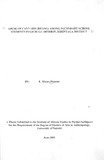| dc.description.abstract | Drug abuse is one of the most serious problems of our times. The problems related to drugs are on the increase in most developing countries and Kenya is no exception. Cannabis is currently the most widely abused illicit drug in Kenya. Its popularity is not limited to any single group of people. It encompasses the 'healthy, middle class and lower income families. It affects students in suburban, urban and the rural areas and includes high achievers and average students. This is despite the fact that cannabis consumed today is far more potent than it ever was in the 1960s and 1970s.
The research was conducted for a period of one month, to investigate the role of basic socialisation units (the family, the school and the peers) in abuse of cannabis by secondary school students. To identify the kind of knowledge, information and attitudes that secondary school student has acquired from these institutions on cannabis, their influence, and effects on students. To achieve this, a psychosocial theoretical model that postulates that deviant behaviours result from socialisation institutions guided the study.
Quantitative and qualitative research methods that is, the questionnaire and focus group discussions were used to collect the data A total of 180 respondents were interviewed and six opinion leaders. The data was analysed using both qualitative and quantitative methods. Quantitative analysis involved calculation of chi-square while qualitative analysis involved a description of students' behaviour in relation to the hypothesized variables.
The results of the study showed that the basic socialization units playa role in abuse of cannabis among secondary school students. They do not adequately inform the students about the consequences of abusing cannabis. Peer influence was found to be very strong in leading students to abuse drugs. The family members unlike the teachers in school were not playing their role adequately to alleviate the problem of cannabis abuse.
The study therefore, recommended strengthening of basic socialisation units by equipping them with information about drugs in order to reduce or to stem out the problem from schools. | en |

